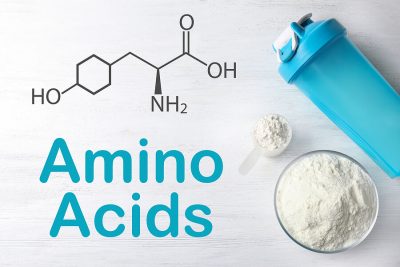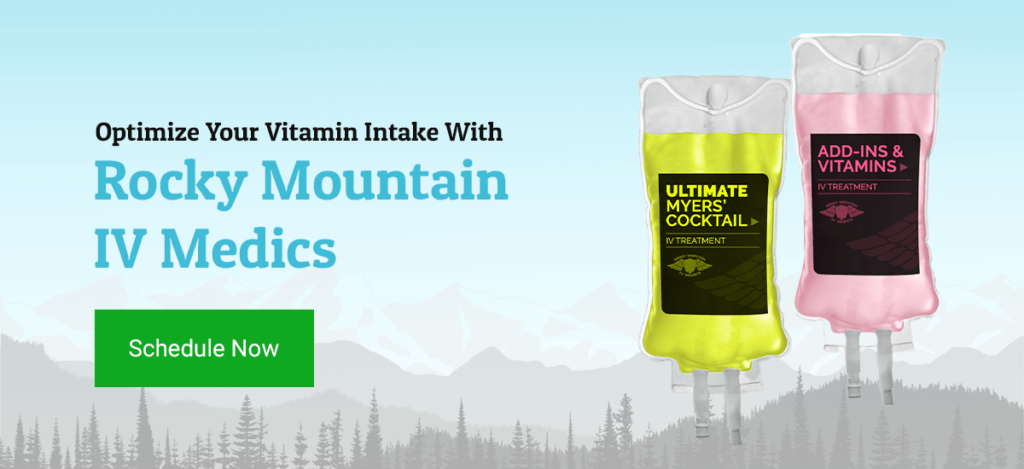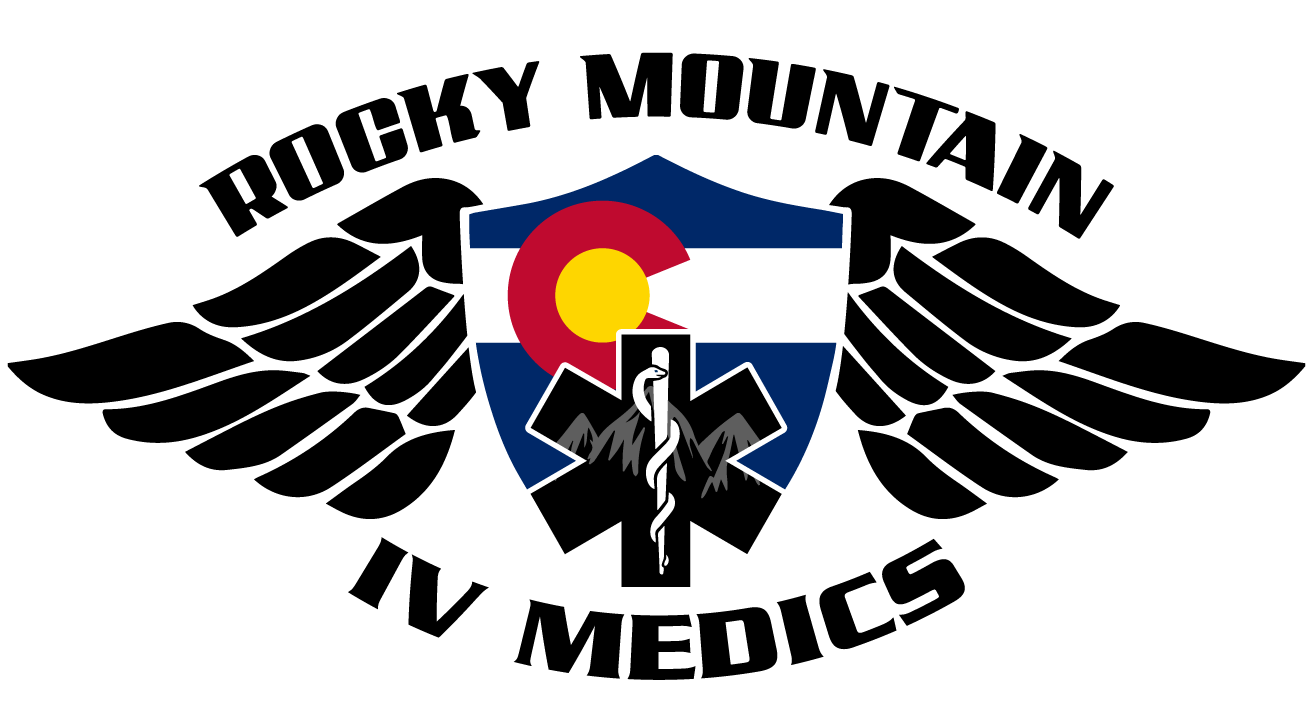Amino Acids 101: Your Complete Guide to Understanding

IV Bolus vs. IV Push: Understanding the Differences
September 8, 2021
Types of IV Fluids: Understanding Your Options
September 27, 2021Amino Acids 101: Your Complete Guide to Understanding

You know that you need oxygen and water to live, but do you know the same holds true for amino acids? They’re integral to life and play a role in just about every function our bodies need to survive. Digestion, muscle building, energy and hormone production, healthy skin, and even a sense of happiness—you can’t have any of these things, and much more, without amino acids.
Luckily, there are ways you can elevate your amino acids and improve your health. One of these ways is through an amino acid IV, which allows your body to absorb amino acids quickly. Before we talk more about how IV treatment works, though, let’s learn more about what amino acids are and how they support the various functions of your body.
What are Amino Acids?
So what are amino acids, anyway? Amino Acids are organic compounds made from four components: nitrogen, carbon, hydrogen, and oxygen. Almost all amino acids also have a side chain composed of different biochemical elements. These side chains make the amino acids unique and link them together to perform different functions.
Amino acids are often referred to as the building blocks of protein. After protein enters your body, it breaks down into amino acids that get to work fulfilling their prescribed roles in the body. The 20 amino acids are grouped into three categories, depending on how the body accesses them.
The three categories that amino acids fall into are essential, nonessential, and conditional. Some amino acids are produced in the body, while others are only found in food. A lack of amino acids may call for supplementation or IV therapy so your body has what it needs to survive and thrive.
Essential Amino Acids
One of the problems with essential amino acids is that your body can’t make them on its own. You have to get amino acids from food or an outside supplement to support your body’s functions. The good news is that amino acids are available in a wide variety of both plant- and animal-based foods, so it’s easy to get what you need if you follow a nutritious, balanced eating plan. These amino acids are also available in over-the-counter supplements and amino acid IVs. The following list includes the nine essential amino acids.
- Histidine
- Isoleucine
- Leucine
- Lysine
- Methionine
- Phenylalanine
- Threonine
- Tryptophan
- Valine
Nonessential Amino Acids
Nonessential amino acids are different from the essential amino acids. The human body can produce these amino acids, though they can also be found in food as well. Despite what this category’s name implies, you do need nonessential amino acids to carry out functions throughout your body and maintain good health. The amino acids in this group include:
- Alanine
- Arginine
- Asparagine
- Aspartic acid
- Cysteine
- Glutamic acid
- Glutamine
- Glycine
- Proline
- Serine
- Tyrosine
Conditional Amino Acids
This final category includes nonessential amino acids that the body only needs at certain times, hence the name conditional amino acids. The human body usually makes these amino acids during a bad illness or stressful experience, fortifying your health and helping you push through it. The following list includes all the conditional amino acids your body uses in these situations:
- Arginine
- Cysteine
- Glutamine
- Glycine
- Proline
- Serine
- Tyrosine
What Do Amino Acids Do?
Now that we know what the various amino acids are, we can answer the question: How do amino acids help the body? Let’s dive into that question a little deeper.
Name a chemical process in the human body, and amino acids probably play a role in it. Repairing and growing tissues? Check. Facilitating communication in the brain through neurotransmitter production? Check. Promoting lustrous hair and strong nails? Check.
This is why it’s so crucial that you have enough amino acids for your body to function correctly. If you’re not getting enough amino acids in your diet, it might be time to consider supplementing your intake with a pill or an amino therapy.
As you can tell, amino acids are good for many things. But each amino acid specializes in certain tasks. Here are some of the roles each one plays in maintaining your overall health:
Essential Amino Acids Functions
- Histidine
Histidine is needed for histamine production. This substance is essential for proper functioning immune, digestive and reproductive systems. Histidine also plays a role in blood cell development, healthy sleep/wake cycles, tissue and nerve cell maintenance and growth.
- Isoleucine
Want to feel strong and vigorous? Get plenty of isoleucine. It contributes to muscle growth and function, energy generation, immunity support and the production of hemoglobin, ensuring your tissues are nourished by the blood in your oxygen.
- Leucine
This amino acid has a diverse portfolio of uses. You need it to help moderate blood sugar levels, synthesize proteins, repair muscles, heal wounds and produce growth hormones.
- Lysine
Build strong bones and skin with lysine. This amino acid functions to make it easier for your body to absorb calcium, and it also produces collagen and elastin, two major proteins necessary for skin health. Lysine also maintains energy levels and the immune system. Plus, it helps keep levels of the stress hormones epinephrine and norepinephrine at a healthy balance.
- Methionine
This amino acid often plays a role in weight loss because it assists with detoxification and metabolism regulation. Methionine can also help with tissue growth and mineral absorption, particularly selenium and zinc.
- Phenylalanine
Your brain uses neurotransmitters in its cellular communication network. This amino acid encourages neurotransmitter production (such as tyrosine and dopamine). Phenylalanine also helps the body synthesize nonessential amino acids.
- Threonine
Like lysine, threonine encourages collagen and elastin production. It also factors into fat metabolism and immunity building.
- Tryptophan
Tryptophan helps regulate the circadian rhythms that help you sleep at night. Tryptophan also helps you feel good because it contributes to the production of the mood-boosting hormone serotonin.
- Valine
Feel empowered with valine. You’ll experience enhanced energy, muscle function and overall growth when you get an adequate supply of this amino acid.
Nonessential/Conditional Amino Acids Functions
- Alanine
This amino acid is needed for healthy liver function.
- Arginine
This amino acid benefits your heart health. Arginine releases nitric acid in your body, which dilates vessels so blood can flow more freely.
- Asparagine
Asparagine supports your vascular health. You need it to make another nonessential amino acid, glutamine, which builds healthy blood vessels. Asparagine also helps the body create muscle tissues and enzymes.
- Aspartic acid
Your cells rely on aspartic acid to carry out their normal functions. This amino acid also regulates the nervous system and hormone production.
- Cysteine
Cysteine is another amino acid you need for healthy skin, hair and nails because it helps produce collagen. It also benefits the skin because it has antioxidant power, which reduces oxidative stress on cells caused by free radical damage.
- Glutamic acid
This is synthesized into glutamate, which facilitates communication between nerve cells in the brain.
- Glutamine
In addition to building blood vessels, glutamine also supports immune and intestinal health.
- Glycine
Glycine is the gift that keeps on giving. It helps create the antioxidant glutathione, which fights free radical damage and disease. It also supports strong muscles with the production of creatine and promotes vibrant skin with its capability to make collagen, among other functions.
- Proline
This amino acid plays a role in cellular function, collagen production, metabolism regulation and more.
- Serine
Serine contributes to healthy sleep patterns and a well-functioning brain and central nervous system. Research indicates serine has the potential to help manage cognitive disorders such as Alzheimer’s disease.
- Tyrosine
This amino acid plays a major part in the production of adrenaline and thyroid hormones, the “feel good” chemical dopamine and the melanin pigments that give your skin, eyes and hair their color.
Can You Be Amino Acid Deficient?
There are many important purposes of amino acids, so it’s crucial to get enough of them. The good news is that it’s typically easy to get adequate amounts of the essential amino acids if you regularly eat a healthy diet. However, deficiencies, while uncommon, can occur as a result of poor eating habits or medical conditions that interrupt amino acid absorption in the body. Signs of a deficiency include thinning hair, skin sores, edemas and loss of muscle mass.
Best Sources of Amino Acids
There are three main ways to get amino acids: in food, supplements, or amino acid IV therapy. In this section, we will go over the pros and cons of these various sources of amino acids and how you can better implement them in your life.
Food
Pros: Essential amino acids are found in a wide variety of foods: meat, dairy, quinoa, salmon, leafy green vegetables, legumes and potatoes, to name a few.
Cons: It can be hard to change unhealthy eating habits, and busy people may find it difficult to plan, shop for and prepare nutritious meals.
Supplements
Pros: Supplements are a convenient way for people to get the amino acids they can’t consume in their diet. There are several different kinds of supplements to choose from, such as protein powders or pills, and they can be relatively affordable.
Cons: Oral supplements lose some of their potency because they have to pass through the digestive system. Medications or health issues also may prevent effective absorption. And you’ll have to do some homework to make sure you purchase a supplement of high quality.
IV Infusions
Pros: Compared to oral supplements, IV therapy delivers amino acids right to the bloodstream. That means they’re rapidly absorbed into the body for potent, immediate effect and usually work faster than oral supplements. Mobile service provides treatment at your home or office for extra comfort.
Cons: It takes longer (about 45 to 60 minutes for a full session) to get IV treatment than to consume an oral supplement (Though IV treatment does deliver vitamins more quickly to your bloodstream). IV treatment is also the most expensive option, and there is a slight chance of infection where the IV is inserted into your skin.
Try Amino Acid IV Therapy with Rocky Mountain IV Medics
Now that you know why amino acids are important, contact us to see how you can benefit from IV treatment. At Rocky Mountain IV Medics, we provide mobile IV therapy throughout Colorado with an array of budget-friendly packages, including amino acid IVs, performance IVs for athletes, and customized IVs with your own hand-picked add-ins. Our experienced medical professionals are also standing by to help you customize your IV for your specific health goals.
A foundation of healthy living and a healthy body starts with feeding your body the right ingredients. Amino acid IV therapy can be integral to your overall plan, supporting your diet and exercise effects and helping you achieve your health goals.
To get started with an amino acid IV, or any of our other IV options, you can give us a call or text us at (720) 987-2155. You can also book an appointment online using our easy online scheduler. Also, feel free to call us with any questions you might have about amino therapy or any of our other treatment options.


